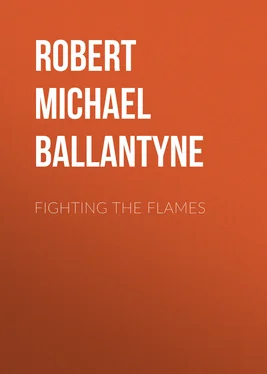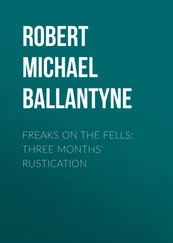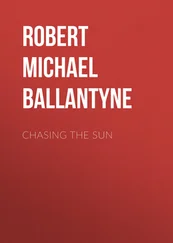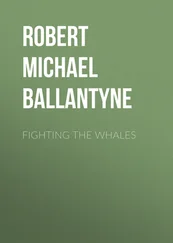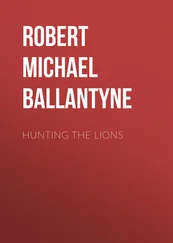Robert Michael Ballantyne - Fighting the Flames
Здесь есть возможность читать онлайн «Robert Michael Ballantyne - Fighting the Flames» — ознакомительный отрывок электронной книги совершенно бесплатно, а после прочтения отрывка купить полную версию. В некоторых случаях можно слушать аудио, скачать через торрент в формате fb2 и присутствует краткое содержание. Жанр: foreign_children, literature_19, foreign_antique, foreign_prose, на английском языке. Описание произведения, (предисловие) а так же отзывы посетителей доступны на портале библиотеки ЛибКат.
- Название:Fighting the Flames
- Автор:
- Жанр:
- Год:неизвестен
- ISBN:нет данных
- Рейтинг книги:4 / 5. Голосов: 1
-
Избранное:Добавить в избранное
- Отзывы:
-
Ваша оценка:
- 80
- 1
- 2
- 3
- 4
- 5
Fighting the Flames: краткое содержание, описание и аннотация
Предлагаем к чтению аннотацию, описание, краткое содержание или предисловие (зависит от того, что написал сам автор книги «Fighting the Flames»). Если вы не нашли необходимую информацию о книге — напишите в комментариях, мы постараемся отыскать её.
Fighting the Flames — читать онлайн ознакомительный отрывок
Ниже представлен текст книги, разбитый по страницам. Система сохранения места последней прочитанной страницы, позволяет с удобством читать онлайн бесплатно книгу «Fighting the Flames», без необходимости каждый раз заново искать на чём Вы остановились. Поставьте закладку, и сможете в любой момент перейти на страницу, на которой закончили чтение.
Интервал:
Закладка:
The instant that the bell rang, however, this state of quietude was put to flight. The two men rose from their couches, and Dale stepped to the door. There was no starting up, no haste in their movements, yet there was prompt rapidity. The men, having been sailors, had been trained in the midst of alarms. The questions which were put to Hopkins, as above described, were rapidly uttered. Before they were answered the two men were ready, and at Dale’s order, “Get her out!” they both vanished.
One ran round the corner to the engine-house and “knocked up” the driver in passing. The other ran from door to door of the firemen’s abodes, which were close at hand, and with a loud double-ring summoned the sleepers. Before he got back to help the first with the engine, one and another and another door opened, and a man darted out, buttoning braces or coat as he ran. Each went into the station, seized his helmet, belt, and axe, from his own peg, and in another moment all were armed cap-à-pie . At the same instant that the engine appeared at the door a pair of horses were trotted up. Two men held them; two others fastened the traces; the driver sprang to his seat; the others leaped to their respective places. Each knew what to do, and did it at once. There was no hurry, no loss of time, no excitement; some of the men, even while acting with the utmost vigour and promptitude, were yawning away their drowsiness; and in less than ten minutes from the moment the bell first rang the whip cracked and the fire-engine dashed away from the station amid the cheers of the crowd.
It may be as well to remark here in passing, that the London Fire Brigade had, at the time of which we write, reached a high state of efficiency, although it could not stand comparison with the perfection of system and unity of plan which mark the organisation and conduct of the Brigade of the present day.
Mr Braidwood, the able Superintendent, had for many years been training his men on a system, the original of which he had begun and proved in Edinburgh. Modifying his system to suit the peculiarities of the larger field to which he had been translated, he had brought the “Fire Engine Establishment,” (which belonged at that time to several insurance companies) to a state of efficiency which rendered it a model and a training-school for the rest of the world; and although he had not the advantage of the telegraph or the powerful aid of the land steam fire-engine of the present day, he had men of the same metal as those which compose the force now.
The “Metropolitan Fire Brigade,” as it then existed under the control of the Metropolitan Board of Works, had been carried by its chief, Captain Eyre Massey Shaw, to a condition of efficiency little if at all short of perfection, its only fault being (if we may humbly venture a remark) that it was too small both in numbers of engines and men.
Now, good reader, if you have never seen a London fire-engine go to a fire, you have no conception of what it is; and even if you have seen it, but have not gone with it, still you have no idea of what it is.
To those accustomed to it, no doubt, it may be tame enough—we cannot tell; but to those who mount an engine for the first time and drive through the crowded thoroughfares of London at a wild tearing gallop, it is probably the most exciting drive conceivable. It beats steeple-chasing. It feels like driving to destruction—so wild and so reckless is it. And yet it is not reckless in the strict sense of that word; for there is a stern need-be in the case. Every moment (not to mention minutes or hours) is of the utmost importance in the progress of a fire. Fire smoulders and creeps at first, it may be, but when it has got the mastery, and bursts into flames, it flashes to its work and completes it quickly. At such times, one moment of time lost may involve thousands of pounds—ay, and many human lives! This is well known to those whose profession it is to fight the flames. Hence the union of apparent mad desperation, with cool, quiet self-possession in their proceedings. When firemen can work in silence they do so. No unnecessary word is uttered, no voice is needlessly raised. Like the movements of some beautiful steam-engine, which, with oiled pistons, cranks, and levers, does its unobtrusive work in its own little chamber in comparative stillness, yet with a power that would tear and rend to pieces buildings and machinery, so the firemen sometimes bend to their work quietly, though with mind and muscles strung to the utmost point of tension. At other times, like the roaring locomotive crashing through a tunnel or past a station, their course is a tumultuous rush, amid a storm of shouting and gesticulation.
So was it on the present occasion. Had the fire been distant, they would have had to commence their gallop somewhat leisurely, for fear of breaking down the horses; but it was not far off—not much more than a couple of miles—so they dashed round the corner of their own street at a brisk trot, and swept into Oxford Street. Here they broke into a gallop, and here the noise of their progress began, for the great thoroughfare was crowded with vehicles and pedestrians, many of whom were retiring from the theatres and music-halls, and other places of entertainment.
To pass through such a crowd without coming into collision with anything required not only the most dexterous driving, but rendered it necessary that some of the men on the engine should stand up and shout, or rather roar incessantly, as they whirled along, clearing everything out of their way, and narrowly escaping innumerable crashes by a mere hairbreadth.
The men, as we said before, having been sailors, seemed to shout with the memory of the boatswain strong upon them, for their tones were pitched in the deepest and gruffest bass-key. Sometimes there was a lull for a moment, as a comparatively clear space of a hundred yards or so lay before them; then their voices rose like the roaring of the gale as a stupid or deaf cabman got in their way, or a plethoric ’bus threatened to interrupt their furious passage.
The cross streets were the points where the chief difficulties met them. There the cab and van drivers turned into or crossed the great thoroughfare, all ignorant of the thunderbolt that was rushing on like a fiery meteor, with its lamps casting a glare of light before, and the helmets of its stern charioteers flashing back the rays of street-lamps and windows; for, late though the hour was, all the gin-palaces, and tobacconists’ shops, and many of the restaurants were still open and brightly illuminated.
At the corner of Wells Street, the crowd of cabs and other vehicles was so great that the driver of the engine began to tighten his reins, and Jim Baxmore and Joe Corney raised their voices to a fierce shout. Cabs, ’busses, and pedestrians scattered right and left in a marvellous manner; the driver slackened his reins, cracked his whip, and the horses stretched out again.
In passing Berners Street, a hansom cab swept round the corner, its dashing driver smoking a cigar in sublime self-satisfaction, and looking carelessly right and left for a “fare.” This exquisite almost ran into the engine! There was a terrific howl from all the firemen; the cabby turned his smart horse with a bound to one side, and lost his cigar in the act—in reference to which misfortune he was heartily congratulated by a small member of the Shoe-black Brigade,—while the engine went steadily and sternly on its way.
“There, it shows a light,” observed one of the firemen to Dale, as he pointed to a luminous appearance in the sky away to the north-east.
Dale was already looking in that direction, and made no reply.
As they reached Tottenham Court Road the driver again checked the pace a little; yet even at the reduced speed they passed everything like a whirlwind. The traffic here was so great that it behoved them to be more cautious. Of course, the more need that there was for caution, the more necessity was there for shouting; and the duty of Baxmore and Corney—standing as they did in front of their comrades beside the driver—became severe, but they had good lungs both of them!
Читать дальшеИнтервал:
Закладка:
Похожие книги на «Fighting the Flames»
Представляем Вашему вниманию похожие книги на «Fighting the Flames» списком для выбора. Мы отобрали схожую по названию и смыслу литературу в надежде предоставить читателям больше вариантов отыскать новые, интересные, ещё непрочитанные произведения.
Обсуждение, отзывы о книге «Fighting the Flames» и просто собственные мнения читателей. Оставьте ваши комментарии, напишите, что Вы думаете о произведении, его смысле или главных героях. Укажите что конкретно понравилось, а что нет, и почему Вы так считаете.
